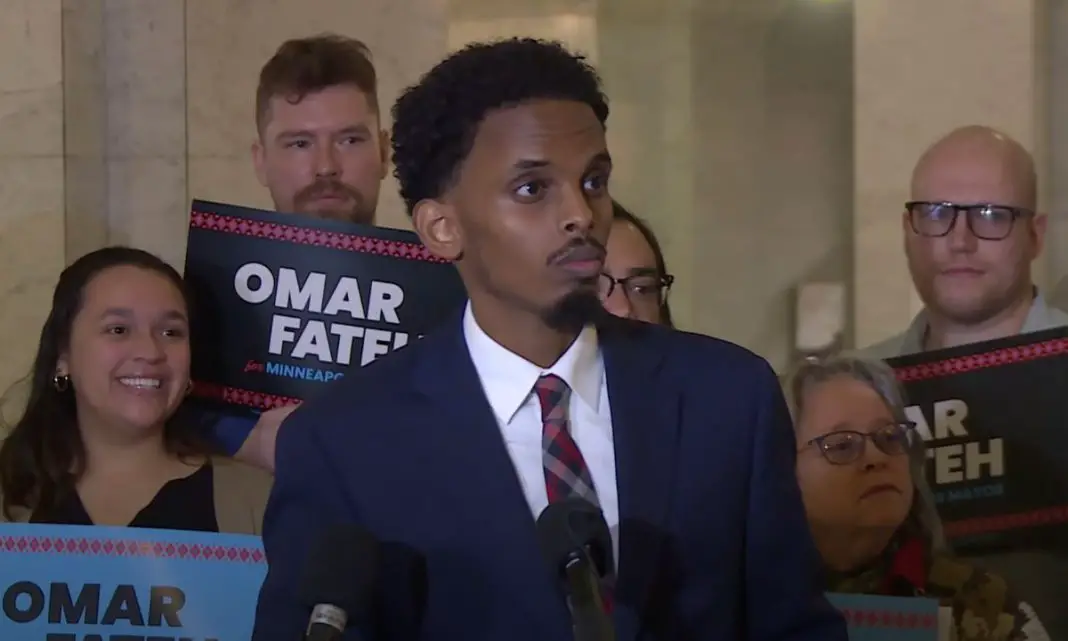In most parts of the United States, the idea of radical socialism struggles to gain traction. For many Americans, including some Democrats, the idea raises red flags—concerns about economic overreach, heavy government intervention, and policies that feel out of touch with everyday priorities like jobs, safety, and affordability.
Even among those who lean left, the sweeping changes tied to democratic socialism can seem too drastic, clashing with a preference for incremental progress. This skepticism frames the surprising rise of a new candidate in Minneapolis, where his voice is challenging the city’s political landscape.
Omar Fateh, a 35-year-old Somali American state senator and self-described democratic socialist, is on the cusp of becoming Minneapolis’ next mayor. With his campaign, he’s aiming to make the city a “last line of defense” against Donald Trump’s policies. He also wants the city to be a “safe haven” for transgender surgeries, as well as abortions. In a city known for its progressive streak, Fateh’s platform pushes the envelope further, promising transformative change through what many see as radical reforms.
Fateh’s agenda centers on uplifting so-called marginalized groups. He pledges to secure “economic justice” for LGBT individuals and people of color, with plans to “prioritize” and “fully fund” initiatives like the city’s Trans Equity Summit.
His platform emphasizes protecting “essential healthcare services,” such as abortion and transgender surgeries, from federal restrictions. To fund his goals, Fateh proposes a city income tax “to ensure the wealthy pay their fair share.” He also aims to freeze rents, expand affordable housing to federal limits, and prioritize housing for “LGBTQ+ and BIPOC people,” who he says face heightened risks of displacement and harassment.
Public safety is a defining issue for Fateh, shaped by the 2020 George Floyd riots, which left Minneapolis grappling with $350 million in damages and multiple lives lost. Running his state senate campaign from a Somali community adult daycare center amid the unrest, Fateh saw the city’s pain up close.
That experience likely formed his anti-police stance that so many other radical socialists hold. It’s also led to Fateh being focused on ending “the cycle of the Minneapolis Police Department’s violence and brutality that has held our city captive for so many years.” His plans include sending “non-police responders” to almost half of 911 calls, strengthening oversight of the police department, and barring police from working with Immigration and Customs Enforcement (ICE) on deportations.
A recent federal drug raid in south Minneapolis, which he called “blatant fascism,” emphasizes this stance. “Whether it’s for an immigration raid or not, our residents deserve a mayor that will stand up to Donald Trump and say, ‘no, not in our community,’” he declares.
Economically, Fateh is pushing for a minimum wage hike from right under $16 to $20 by 2028, alongside investments in housing and social services. His 2020 state senate campaign championed progressive causes—drug decriminalization, universal healthcare, climate justice, free education, childcare, transit, and ending “exclusionary zoning.” These ideas won him support from Black Lives Matter, the Democratic Socialists of America, and the Sunrise Movement, a Green New Deal advocate.
Fateh’s deep roots in Minneapolis’ Somali community are central to his identity. Born in Washington, D.C., to Somali immigrants and later moving to Minneapolis after George Mason University, he refers to Somalia as “home.”
“I understand that our Somali communities are all connected to each other here in Minnesota and back home, and I ask for your support,” he said at a local Somali event during his senate campaign. Yet these ties have sparked controversy. In 2022, he faced an ethics probe over allegations he pushed for $500,000 in taxpayer funds for a Somali news outlet that gave him an endorsement. In 2023, he drew criticism for suggesting on the Senate floor that domestic terrorists usually look like his white colleagues.
Fateh’s rise aligns with a wave of democratic socialists gaining ground in major cities, like Zohran Mamdani, who recently won New York City’s Democratic mayoral nomination. Both share a focus on radical policies—rent freezes, social spending, and non-police responses to crises.
In Minneapolis, Fateh’s unexpected endorsement by the local Democratic Party last Saturday stunned incumbent mayor Jacob Frey, who has challenged the decision. Frey, who led the city through the Floyd riots and faced protests over his policing stance, now faces a tough fight in the November 4 election.
Fateh’s campaign is a bet that there are some Americans out there who have an appetite for his socialist stances. “This endorsement is a message that Minneapolis residents are done with broken promises, vetoes, and politics as usual. It’s a mandate to build a city that works for all of us,” he said in a post on X.
And while Omar Fateh may find enough votes necessary to win his election, that doesn’t mean that Americans across the country are ready to sign up for socialism in their towns or cities. Minneapolis and New York City are hopefully outliers in a country that still finds some pride in the original principles it was founded on.
Are you worried about the rise of socialism in some American cities? Why or why not? Let us know what you think by posting in the comments!


This is just what the brainless Democrats and Muslims deserve if this Commie wins.
If he is put into office the voters deserve what they get.